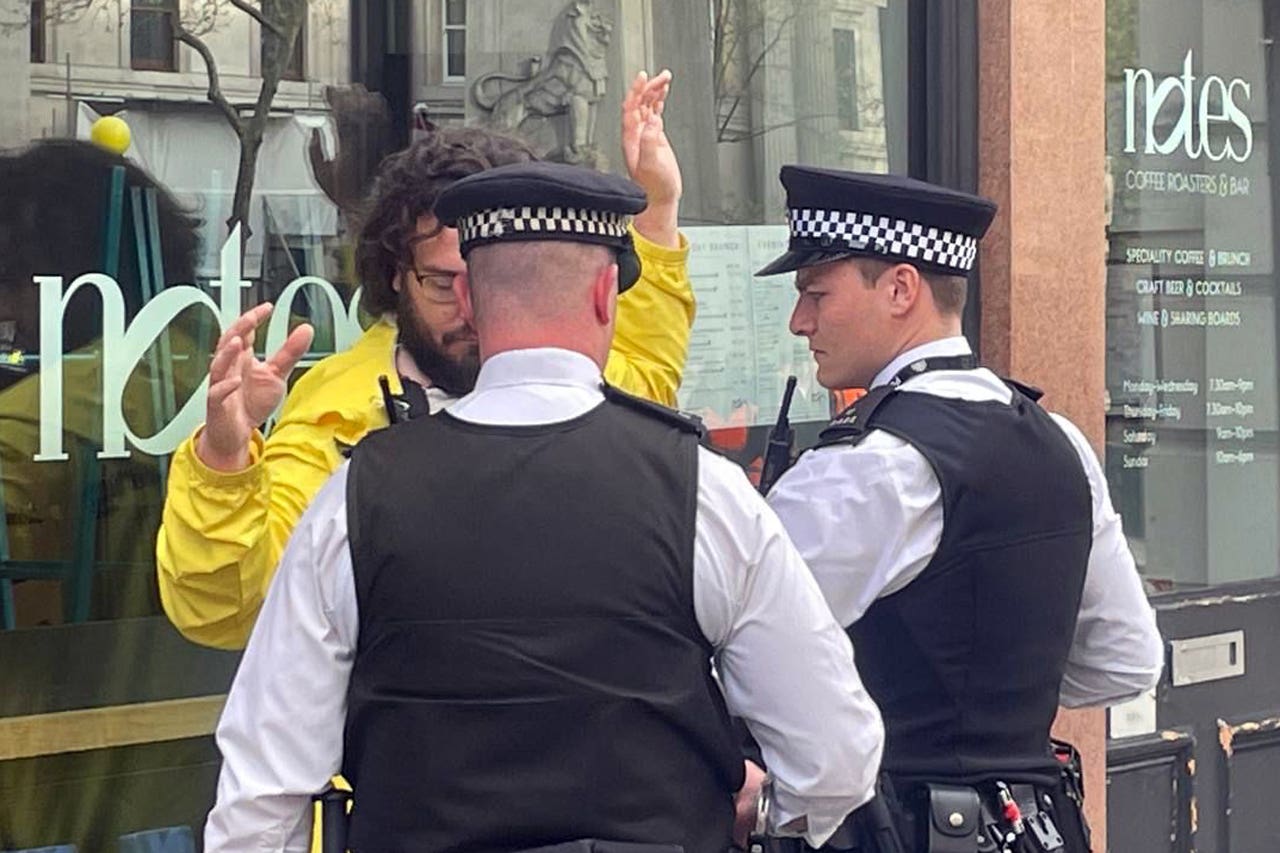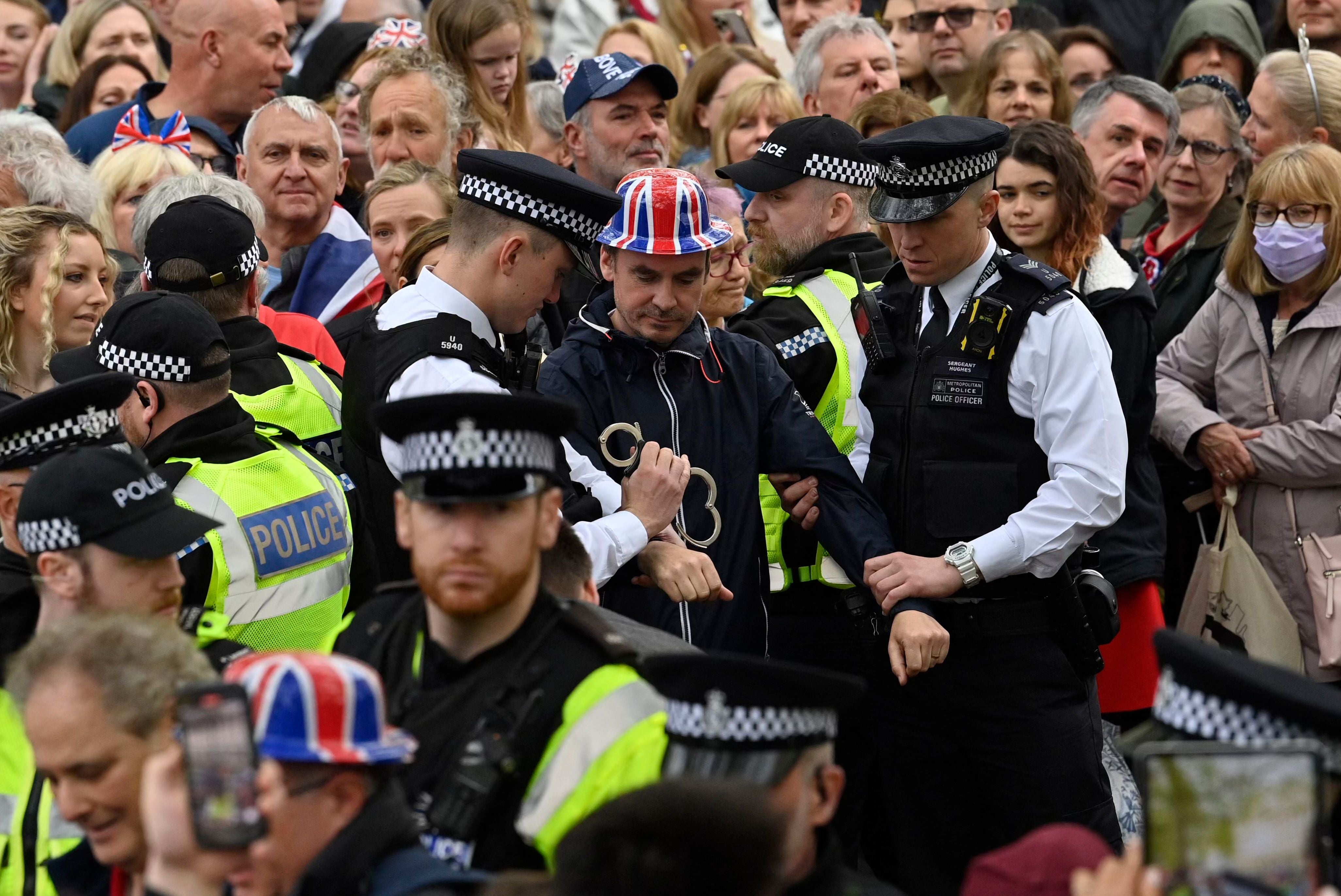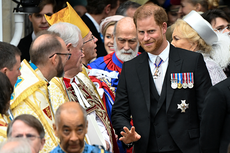Police accused of ‘totalitarian crackdown’ after anti-monarchist spends 16 hours in custody
Chief executive of the Republic campaign group remains in custody - despite organising rally with Met Police


The chief executive of an anti-monarchy group who was arrested on the day of the King’s coronation has been released, after critics accused police of enforcing a “totalitarian crackdown.”
Graham Smith was released after nearly 16 hours in police custody, while the majority of his Republic colleagues continued to be held.
After emerging at around 11pm on Saturday, Mr Smith said there was “no longer a right to peaceful protest in the UK”.
“I have been told many times the monarch is there to defend our freedoms. Now our freedoms are under attack in his name,” he wrote on Twitter.
Some 52 protesters from anti-monarchy and environmental groups were arrested on the day of the coronation, in what they slammed as a “dystopian nightmare”.
The Metropolitan Police had said it would facilitate anti-monarchy demonstrations unless they contravened existing laws or new powers that came into force last week banning “locking-on” and causing “serious disruption”.
But members of the Republic campaign group were arrested on Saturday morning and saw hundreds of placards reading “Not My King” seized by the force, despite gaining police permission for a rally in Trafalgar Square.
The group said its chief executive Graham Smith and five organisers were still in custody hours after the coronation had finished, writing on Twitter: “We are not being given a reason. They will probably be released when the whole monarchy PR show is over.”
One of the protesters joining the Republic rally, 30-year-old Harry Stratton, said police had told him that anyone getting in the way of the coronation procession “might get shot at”.
“They said ‘slogans. chanting - go for it - but if you start saying Andrew and the sex stuff we will start arresting,” he told The Independent.
Members of Republic were among around 50 protesters arrested, including other anti-monarchists, supporters of Just Stop Oil.
Animal Rising said a number of its supporters were apprehended on Saturday while at a training session “miles away from the coronation”.
Nathan McGovern, spokesman for the campaign group, described the arrests as “nothing short of a totalitarian crackdown on free speech and all forms of dissent”.
Amnesty International UK was among the human rights groups raising alarm about the arrests, saying peaceful protest was “clearly protected” under international law, while a Human Rights watch official slammed “scenes you’d expect to see in Russia not the UK”.
The Metropolitan Police said a total of 52 arrests had been made as part of the policing operation around the coronation of King Charles III, codenamed Operation Golden Orb.
Of those, thirty-two were arrested “on suspicion of conspiracy to cause a public nuisance” - a new criminal offence created by a controversial package of protest powers that came into force last year.
They included the Republic protesters, members of Animal Rising who were conducting training several miles away, and supporters of Just Stop Oil.
While the environmental group has become known for blocking roads in disruptive protests, it said that on Saturday members “had no glue, paint or any plans to disrupt the coronation”.

Just Stop Oil said around 20 supporters had been arrested, including a 33-year-old doctor who was “planning to quietly hold a sign saying JUST STOP OIL, whilst in the crowd for the coronation”. A tweet added: “We are living in a dystopian nightmare.”
Police said 15 other people were arrested “to prevent a breach of the peace” near the coronation procession route, while other arrests were made for non-protest related crimes including drugs possession, sexual assault, affray and racially-aggravated harassment.
Ahead of the coronation, the Metropolitan Police announced they would have an “extremely low threshold” for protests during the celebrations, and that demonstrators could expect “swift action” if they broke the law.
But deputy assistant commissioner Ade Adelekan said officers would not intervene over someone merely “holding a placard” in London.
The officer who led the operation defended the protest arrests on Saturday afternoon, praising the work of 11,500 officers who were part of the coronation policing operation.
Commander Karen Findlay, who is leading the operation, said: “We absolutely understand public concern following the arrests we made this morning.
”Protest is lawful and it can be disruptive. We have policed numerous protests without intervention in the build-up to the coronation, and during it.
“Our duty is to do so in a proportionate manner in line with relevant legislation. We also have a duty to intervene when protest becomes criminal and may cause serious disruption.

“This depends on the context. The coronation is a once in a generation event and that is a key consideration in our assessment.”
A controversial package of new laws came into force under the Public Order Act on Tuesday, making it illegal for protesters to “lock on” and allowing police intervention against “serious disruption”.
Another controversial package of protest laws brought in last year made “public nuisance” a new criminal offence.
Sacha Deshmukh, the chief executive of Amnesty International UK, said: “Peaceful protest is clearly protected under international human rights law and it’s been worrying to see the police this week making numerous statements about their ‘low tolerance’ for disruption at the coronation.
“We’ve recently had the introduction of extremely draconian legislation outlawing ‘disruptive’ or ‘noisy’ protests, which has given the police excessive – and highly subjective – powers and seriously damaged people’s right of free speech and public assembly.
“The coronation shouldn’t become yet another excuse for undermining people’s basic human rights in this country.”
Yasmine Ahmed, the UK director of Human Rights Watch, said people had been arrested “for peacefully protesting against the monarchy”, adding: “These are scenes you’d expect to see in Russia not the UK. It’s disgraceful not dazzling.”
Separately, Westminster Council cabinet member for communities and public protection Aicha Less said she was “deeply concerned” over reports of arrests of members of its Night Star volunteer team, who assist vulnerable people on the streets late at night.
“We are working with the Metropolitan Police to establish exactly what happened, and in the meantime, we are in touch with our volunteers to ensure they are receiving the support they need,” she said.



Bookmark popover
Removed from bookmarks